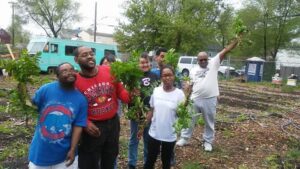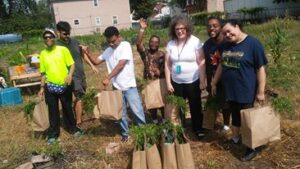Final report for YENC19-135
Project Information
Special needs youth and youth with developmental disabilities will grow, market, and sell produce at our farmstand, learn cultivation, business, and community relation skills key to financial sustainability in urban agriculture while creating equitable access to fresh organic produce.

Youth will perform farmwork informed by concepts of sustainable farming and workdays at local farms. During farmstand, students will lead tours of the farm, perform cooking demonstrations, and manage sales and data. Youth will regularly share experiences via social media.
Youth will participate in an on-site farmstand where they participate in the harvesting, packing, and sales of produce to the local community. They will participate in outreach efforts involving fliering, and will learn the ins and outs of operating an on-site community farmstand. Youth will exhibit project experience at the Fall Harvest Festival.
- Encourage Special Needs Youth to develop leadership skills through leading farm tours and designing cooking demonstrations for the farmstand
- Provide hands-on organic farming experience in the growing, harvesting, and packing of culturally-relevant crops
- Give youth experience in community outreach and advertising using social media and direct marketing
- Create a product—the Community Cookbook—to share the success of the farmstand (pounds of produce sold, income generated, customer attendance), and community impact (youth
 reflections, customer testimonies, recipes)
reflections, customer testimonies, recipes) - Educate Youth on inclusivity and active listening to sustain a positive, safe, and welcoming environment at the farm and farmstand
Cooperators
Educational & Outreach Activities
Participation Summary:
Participants led on-site farm tours for the community. They engaged in multiple workshops around microgreen production, honey harvesting, and food preparation. Participants also went door to door with fliers publicizing the community farmstand and engaged with community members.
Learning Outcomes
growing food
nutrition awareness
teamwork
organic farming
beekeeping and pollinator habitat
managing a farmstand
The program included nutrition workshops and cooking demonstrations using produce from the garden, hands-on activities such as cultivation, planting bed preparation, planting, post-harvest processing, packing, as well as harvesting for a community farmstand and staffing the farmstand. Participants learned about the importance of a resilient food system through the lens of urban farming, incorporating culturally relevant crops, building an inclusive team, and building community around food.
Participants also learned in-depth food safety around the harvesting and packing of fresh produce to the public, and followed the Star Farm Food Safety SOPs and the Farmstand SOPs to ensure the highest quality product and display to the community.
Participants also learned the structure of a CSA and the business model behind direct to consumer delivery services.
In bridging the gap between growing food and eating food, we decided to complete a digital cookbook that is shared on social media with the Back of the Yards community. The youth decided that the best way to connect with the community was to include hearty, accessible recipes that utilized our produce. The link to the recipe guide is below.
Star Farm Recipe Instagram Posts
Project Outcomes
Two parents had backyard gardens and reported expanding them and using seedlings available from the farm and wanting to also incorporate bees and fruit trees.
Working with families is valuable to ensure that every member of the household receives support and encouragement to eat healthier and support local farmers when they can. Offering programming for children, older youth, adults with disabilities, and heads of household engages the whole family. Offering cooking demonstrations helps connect the food preparation aspect to the food production aspect, and sharing information about nutrition, food deserts, food security, and how urban farms like ours can help increase local health and build community.
As an inclusive farm site, support from this program allowed us to host more team building and educational workshops across our programs--our Disability Farmers program and our summer youth program. Participants genuinely seemed to enjoy themselves and have fun with each other and find places of common ground instead of differences.
"I love eating vegetables. Fruit, tomatoes, salad, it's okay. I like it"
"It's good for the planet" (urban gardens)